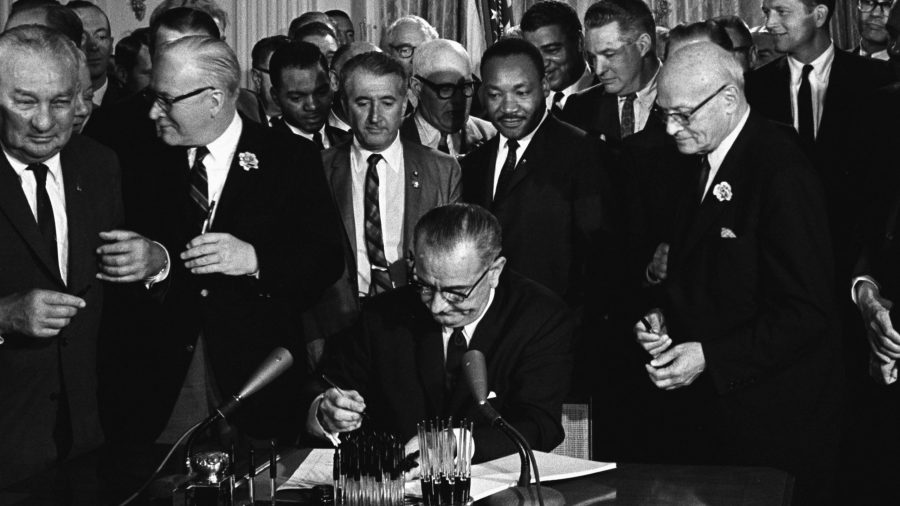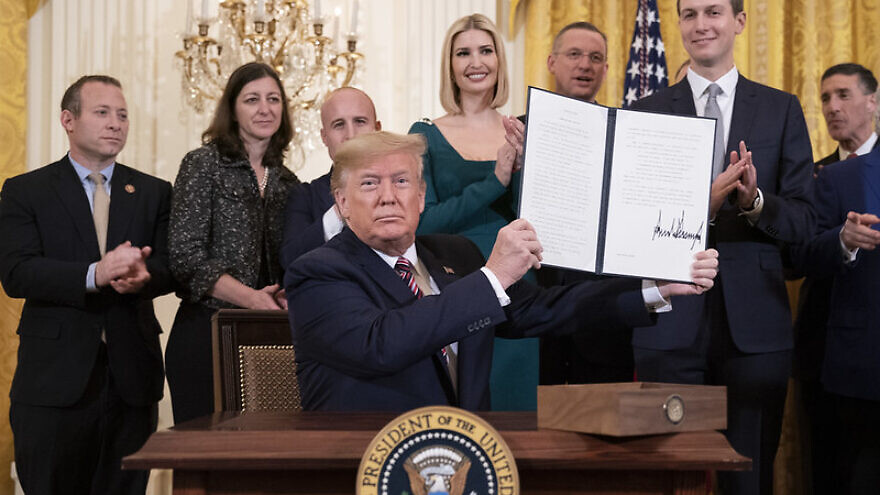U.S. President Donald Trump’s signing of an executive order on Dec. 11, 2019, applying Title VI of the 1964 Civil Rights Act to Jewish Americans, is arguably the most significant single presidential action protecting their civil rights since President Lyndon B. Johnson signed the landmark Civil Rights Act into law 55 years ago. Title VI of the 1964 Civil Rights Act defines the anti-discrimination requirements for educational institutions to receive federal U.S. funding.
Trump’s order calls upon federal agencies to enforce Title VI and protect the civil rights of Jews as an ethnically distinct religious minority. The order references the path-breaking International Holocaust Remembrance Alliance’s (IHRA) working definition of anti-Semitism, which in the American Title VI context would protect Jews on campus from discrimination, including their right to support Jewish self-determination (Zionism) in the Land of Israel. The presidential order is a setback for anti-Semites on U.S. campuses who have masked their hatred and discrimination against Jews supporting Israel, claiming their speech and actions are “legitimate criticism” protected as free speech.
In historical terms, Trump’s presidential action comes at a time of intensifying and deadly anti-Semitic violence against Jews across the United States. The moment is reminiscent of the deadly racial violence of the early 1960s against African-Americans when President John F. Kennedy proposed civil rights legislation, and Lyndon B. Johnson pushed it through Congress and signed it into law.
Trump has also furthered the legacy of Dr. Martin Luther King, who championed the civil rights of African-Americans more than 60 years ago and mobilized millions against racism and discrimination. In 1967, in an act of moral solidarity with Jews and the Jewish state, just months before his assassination, King stood firmly against the efforts of those who attempted to differentiate anti-Zionism from anti-Semitism.

However, the president’s order also closed a loophole. Religious discrimination per se was excluded under Title VI of the 1964 Civil Rights Act that outlines anti-discrimination requirements for educational institutions in order to receive federal U.S. funding. Title VI states, “Simple justice requires that public funds, to which all taxpayers of all races [colors and national origins] contribute, not be spent in any fashion which encourages, entrenches, subsidizes or results in racial [color or national origin] discrimination.”
The exclusion of religious discrimination under Title VI left a civil rights loophole—a vacuum for bigotry—that had in fact seen a dramatic rise in anti-Semitic assaults against Jews and the Jewish state since 2013, many of them on U.S. campuses, according to the Anti-Defamation League. Much of the college and university anti-Semitism is commingled with and masks itself as “legitimate political criticism of Israel.” Trump’s expansion of the definition of anti-Semitism under Title VI to include “other aspects of anti-Semitism including ethnic, racial or national characteristics,” closed that technical loophole.
Trump’s closing of that gap was also reinforced by his referencing the IHRA working definition of anti-Semitism and applying it to civil rights and anti-Semitism on U.S. campuses. The IHRA definition includes expression of anti-Semitism, “denying the Jewish people their right to self-determination, e.g., by claiming that the existence of a State of Israel is a racist endeavor. The definition also includes applying double standards by requiring of Israel a behavior not expected or demanded of any other democratic nation, using the symbols and images associated with classic anti-Semitism (e.g., claims of Jews killing Jesus or blood libel) to characterize Israel or Israelis, drawing comparisons of contemporary Israeli policy to that of the Nazis, or holding Jews collectively responsible for actions of the state of Israel.”
Trump’s application of the IHRA definition equating anti-Zionism to anti-Semitism undermined individuals and groups hostile to Jews and supporters of the Jewish state on university campuses where they insisted that their anti-Semitism against Jews was innocent and protected “political criticism” of the Jewish state. BDS warfare on campuses, led by hate groups such as the Hamas-supporting Students for Justice in Palestine, have regularly employed anti-Semitic tropes, images and slogans demonizing and delegitimizing Israel. Jews and other supporters of Israel have been denounced with terms such as “Nazi, apartheid, genocidal and ethnic cleansing” that both the State Department and IHRA classifications have designated as anti-Semitic.
Today, anti-Zionist Jewish and Palestinian groups hostile to Israel have mobilized to fight the White House’s expanded protections against anti-Semitism. It will now be more difficult for these groups to hide behind the “shield” of human rights and free speech. That is why there is a long list lining up to denounce the Trump action and the IHRA classification of anti-Semitism. They include far-left groups such as Jewish Voice for Peace, If Not Now, J Street, campus groups such as Students for Justice in Palestine, the Palestine Solidarity Committee, Palestinian BDS Apartheid networks incited by the online Electronic Intifada, Palestinian expat academics, and student BDS warfare leaders.
The Electronic Intifada did not hide its hatred for Israel and the executive order, saying that the “definition conflates bigotry against Jews, on the one hand, with criticism of Israel and its racist state ideology, Zionism, on the other. Yousef Munayyer, director of the U.S. Campaign for Palestinian Rights and a BDS leader, who has referred to “apartheid, ethnic cleansing and genocide” to characterize Israel, charged, “Mr. Trump’s order is part of a sustained campaign ‘to silence Palestinian rights activism.’ ” Anti-Zionist and Palestinian hate groups will now risk their status on university campuses to maintain their rhetorical war against Jews, particularly those supporting Israel.
Trump’s order underscores the intersection of racism and anti-Semitism. However, his action is not sui generis. Rather, it represents a continuation of the legacy of Martin Luther King, who frequently compared the ills of racism against American Blacks and anti-Semitism against American Jews.
King, too, rejected the false distinction between anti-Semitism and anti-Zionism. History scholar Martin Kramer corroborates and details King’s encounter with anti-Zionism in his book The War on Error: Israel, Islam, and the Middle East, as recalled by Professor Seymour Lipset, who had joined King during his meeting with Harvard students. Lipset related:
“Shortly before he was assassinated, Martin Luther King Jr. was in Boston on a fund-raising mission, and I had the good fortune to attend a dinner, which was given for him in Cambridge. This was an experience that was at once fascinating and moving: one witnessed Dr. King in action in a way one never got to see in public. He wanted to find what the Negro students at Harvard and other parts of the Boston area were thinking about various issues, and he very subtly cross-examined them for well over an hour and a half. He asked questions and said very little himself. One of the young men present happened to make some remark against the Zionists. Dr. King snapped at him and said, ‘Don’t talk like that! When people criticize Zionists, they mean Jews. You’re talking anti-Semitism!’ ”
Dr. King’s rejection of the false distinction between anti-Zionism and anti-Semitism in 1967 was ahead of its time. Trump transformed King’s moral fight against anti-Semitism and anti-Zionism into a presidential order in 2019, thereby adding a link in the chain of bipartisan presidential leadership actions to counter civil rights discrimination first proposed by Kennedy and ultimately signed into law by Johnson more than 60 years ago.
Dan Diker is a foreign-policy fellow at the Jerusalem Center for Public Affairs and a research fellow at the International Institute for Counter-Terrorism at IDC Herzliya.
This article was first published by the Jerusalem Center for Public Affairs.


























